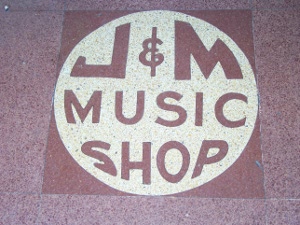Last night I watched a wonderful documentary, Muscle Shoals, highly recommended for anyone who was/is a fan of Wilson Pickett, Aretha Franklin, the Allman Brothers, the Stones and on and on. That studio created a lot of hits.
It’s the story of Rick Hall and his famous FAME Studios in Muscle Shoals, Alabama and the fantastic music and the unique sound that emanated from that studio. It’s a first-class, high-quality music documentary and features people like Pickett, Keith Richards, members of the Swampers (FAME’s famous back-up band, which was immortalized in the Lynyrd Skynyrd tune “Sweet Home Alabama”), Stevie Winwood, Aretha and many more.
Viewing it made me wish for someone to do a documentary on Cosimo Matassa’s J&M Studio—especially in Cos’s lifetime.
One thing that struck me is that the music that came out of Muscle Shoals is stuff that’s really dear to me; it’s the music I grew up with. It was mentioned several times throughout the documentary that these hits came out of the South, at a time when black and white musicians didn’t play together. It was interesting to hear some of the black musicians comment on the fact that they thought the FAME band were black cats, and they were surprised to find that they were white guys—they all call themselves “country boys.”
Hall and the band talked about how there were absolutely no racial issues. They were musicians, and their music made them totally equal and free (major problems did come about when Jerry Wexler recorded there, but they had more to do with alcohol, drugs and male egos—go figure).
Making music together isn’t about race. It’s about communication on a level that goes way beyond words. How great is that?
At the same time Alabama governor George Wallace was proclaiming “Segregation now, segregation tomorrow and segregation forever,” some of the greatest musical collaborations in history were taking place in Muscle Shoals with both black and white musicians, whose only language was that of the music they were making together.
It made me think about what a great equalizer music is: it makes no difference what color your skin is—if you’re in the groove, you’re in the groove. How many times have you been to a festival, parade or music club and seen people of all ages, sexes, races and “musical orientations” united in their love for a tune?
There are white rappers and soul singers, black opera singers and country artists, Asian funksters, Filipino pop singers. Music is one of the things that make us most human. And music certainly is the language of New Orleans.





